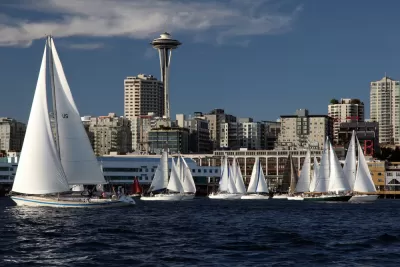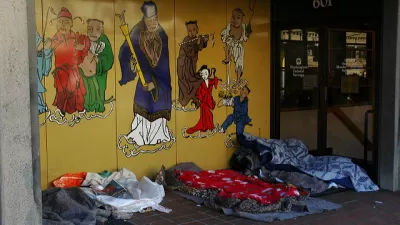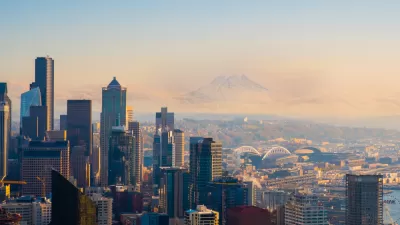A proposed capital gains tax would invest $37 million per year in solving affordable housing and homelessness crises in Seattle.

In Seattle, three tax measures are on the table, reports Natalie Bicknell: "the $500 million 'Amazon Tax' sponsored by Councilmembers Kshama Sawant and Tammy Morales, and the $200 million 'JumpStart Seattle' plan put forth recently by Councilmember Teresa Mosqueda. Now Councilmember Andrew Lewis has introduced a third measure into the mix, a 1% capital gains tax on stocks and bonds when sold for profit that Council Central Staff estimate could raise roughly $37 million per year." The income from the proposed capital gains tax would be used to bankroll homeless and affordable housing services in Seattle.
Given the financial hardship caused by the economic consequences of the coronavirus pandemic, increasing revenue is an issue of great concern to Seattle lawmakers. The financial strain felt by low-income Seattleites means the solution needs to avoid regressive taxation by all means possible. A Washington State Supreme Court ruling reaffirming income is property (and therefore taxable) makes an income tax a regressive option standing in stark contrast to a capital gains tax, which has long been on the table, but has not garnered widespread support in the past. "The fact that the tax’s proceeds would be earmarked specifically for permanent supportive housing and homeless services could bolster support," observes Bicknell.
FULL STORY: A Capital Gains Tax for Seattle? New Progressive Revenue Measure Enters the Conversation

Planetizen Federal Action Tracker
A weekly monitor of how Trump’s orders and actions are impacting planners and planning in America.

Chicago’s Ghost Rails
Just beneath the surface of the modern city lie the remnants of its expansive early 20th-century streetcar system.

San Antonio and Austin are Fusing Into one Massive Megaregion
The region spanning the two central Texas cities is growing fast, posing challenges for local infrastructure and water supplies.

Since Zion's Shuttles Went Electric “The Smog is Gone”
Visitors to Zion National Park can enjoy the canyon via the nation’s first fully electric park shuttle system.

Trump Distributing DOT Safety Funds at 1/10 Rate of Biden
Funds for Safe Streets and other transportation safety and equity programs are being held up by administrative reviews and conflicts with the Trump administration’s priorities.

German Cities Subsidize Taxis for Women Amid Wave of Violence
Free or low-cost taxi rides can help women navigate cities more safely, but critics say the programs don't address the root causes of violence against women.
Urban Design for Planners 1: Software Tools
This six-course series explores essential urban design concepts using open source software and equips planners with the tools they need to participate fully in the urban design process.
Planning for Universal Design
Learn the tools for implementing Universal Design in planning regulations.
planning NEXT
Appalachian Highlands Housing Partners
Mpact (founded as Rail~Volution)
City of Camden Redevelopment Agency
City of Astoria
City of Portland
City of Laramie





























